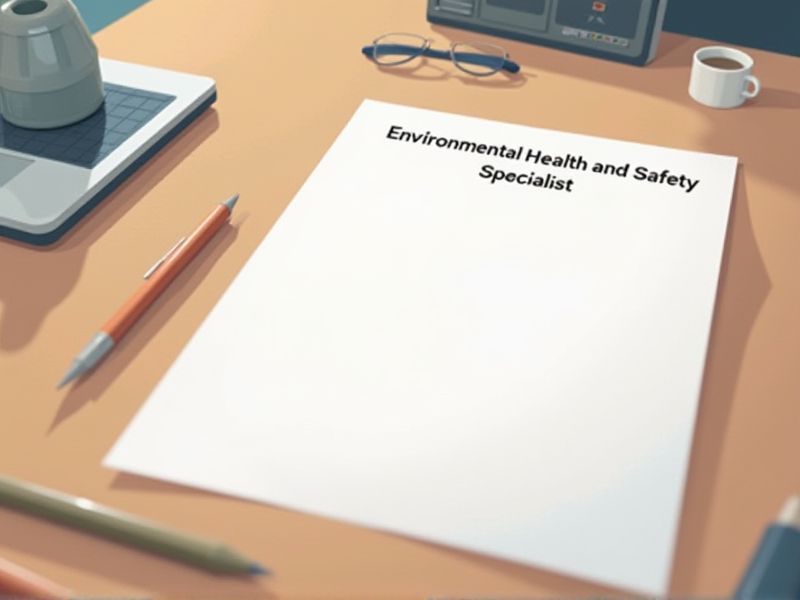
An Environmental Health and Safety (EHS) Specialist must ensure compliance with safety regulations and minimize risks in the workplace. Reaching this level of expertise often requires specific certifications that validate the specialist's knowledge and capabilities. These certifications not only enhance a specialist's understanding of complex regulatory requirements but also improve their ability to implement effective safety practices. Several key certifications are essential for advancing as an Environmental Health and Safety Specialist.
Certified Safety Professional (CSP)
Earning a Certified Safety Professional (CSP) credential demonstrates a comprehensive understanding of safety management principles, which enhances the credibility of an Environmental Health and Safety (EHS) Specialist. This certification equips specialists with advanced skills to identify hazards and develop effective mitigation strategies, leading to reduced workplace incidents. Employers often require or prefer CSP certification as it signifies a professional commitment to maintaining high standards in safety practices. The CSP credential also opens opportunities for career advancement and higher earning potential within the EHS field.
Certified Industrial Hygienist (CIH)
A Certified Industrial Hygienist (CIH) is crucial for Environmental Health and Safety Specialists because they possess specialized knowledge in recognizing, evaluating, and controlling workplace hazards. This expertise helps in developing effective strategies to minimize risks associated with exposure to harmful substances. CIHs ensure compliance with regulations and standards, reducing legal and financial liabilities for companies. Their skills aid in promoting a safer work environment, leading to improved employee health and productivity.
Associate Safety Professional (ASP)
An Environmental Health and Safety Specialist needs the Associate Safety Professional (ASP) credential as it signifies a recognized competency in safety principles, which enhances their ability to assess and manage workplace hazards effectively. The ASP credential equips specialists with advanced knowledge and skills, improving their capability to develop and implement robust safety programs. By holding an ASP certification, specialists gain credibility, influencing organizational decisions in favor of enhanced safety measures. Achieving ASP status often leads to career advancement opportunities, as it is increasingly seen as a standard for professional growth in the safety industry.
Registered Environmental Health Specialist (REHS)
A Registered Environmental Health Specialist has specialized training that ensures comprehensive understanding of public health and safety standards. Their expertise aids in identifying potential hazards and implementing effective risk management strategies. Their certification signifies a commitment to best practices, enhancing credibility in regulatory compliance and education initiatives. The knowledge they bring is crucial for developing and maintaining programs that safeguard community well-being and environmental integrity.
Certified Hazardous Materials Manager (CHMM)
Employing a Certified Hazardous Materials Manager ensures compliance with regulations, reducing the risk of costly fines and legal issues. Their expertise enhances workplace safety by effectively managing and mitigating hazardous material risks. With a deep understanding of environmental policies, a CHMM aids in preventing environmental contamination and ensures sustainable operations. Their certification establishes credibility and trust among stakeholders, contributing to a safer organizational reputation.
OSHA 30-Hour General Industry Certification
OSHA 30-Hour General Industry Certification is needed for Environmental Health and Safety Specialists because it provides comprehensive training on workplace safety standards, reducing the risk of accidents and injuries. Understanding OSHA regulations helps specialists design and implement effective safety protocols, ensuring compliance with federal laws. The certification also demonstrates a commitment to maintaining high safety standards, which can enhance the credibility of EHS professionals in various industries. Equipped with this knowledge, specialists can identify potential hazards and implement preventive measures, fostering a safer work environment.
Certified Professional Ergonomist (CPE)
A Certified Professional Ergonomist (CPE) is needed for an Environmental Health and Safety Specialist to enhance workplace safety by identifying ergonomic risks and implementing evidence-based solutions. This expertise reduces the incidence of work-related musculoskeletal disorders, leading to a healthier workforce and decreased absenteeism. Organizations benefit from CPE insights by optimizing work environments, which improves employee productivity and satisfaction. CPEs ensure compliance with industry standards and regulations, minimizing legal liabilities and financial penalties for companies.
Construction Health and Safety Technician (CHST)
CHST certification indicates a comprehensive understanding of construction-specific health and safety protocols, benefiting Environmental Health and Safety Specialists by enhancing job-site safety standards. Expertise in CHST enables specialists to navigate complex regulatory environments, ensuring compliance and minimizing legal risks. With CHST knowledge, specialists can effectively identify and mitigate construction-related hazards, reducing the incidence of workplace injuries. The certification bolsters a specialist's credibility, reinforcing stakeholder trust and promoting a culture of safety across construction projects.
Occupational Health and Safety Technologist (OHST)
The involvement of an Occupational Health and Safety Technologist enhances workplace safety protocols by providing specialized insights into risk management, thereby mitigating potential hazards. With their expertise, Environmental Health and Safety Specialists can develop comprehensive safety plans that are aligned with both regulatory standards and industry best practices. The incorporation of an OHST ensures accurate hazard assessments and contributes to effective training programs, ultimately leading to lower accident rates. Collaboration with an OHST helps in maintaining compliance with health and safety regulations, minimizing legal liabilities for the organization.
Certified Environmental Professional (CEP)
A Certified Environmental Professional (CEP) ensures compliance with environmental laws and regulations, reducing the risk of legal issues for organizations. Possessing a CEP credential signifies a thorough understanding of best practices in sustainability and resource management, which are crucial for maintaining corporate responsibility. The certification provides credibility and trust, aiding in the development of effective health and safety strategies. Access to the latest industry developments and continuing education through CEP certification directly enhances the effectiveness of Environmental Health and Safety Specialists.
Summary
You, as an Environmental Health and Safety Specialist, can anticipate increased job opportunities and recognition with certifications. Your expertise will be more trusted, potentially leading to enhanced workplace safety and compliance. Certification often reflects a commitment to continued learning, making you a preferred candidate for employers. Employers generally experience improved risk management and reduced liability when hiring certified professionals like you.
